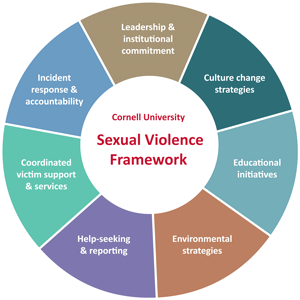Our campus approach
Cornell recognizes sexual violence and related forms of misconduct (dating violence, domestic violence, sexual harassment, stalking) are serious campus and public health issues that affect every member of our community. Sexual violence causes significant harm to those who are victimized, indirectly harms others and contributes to a climate of hostility and fear that is antithetical to the learning mission of the university.
Sexual violence and related misconduct are cultural phenomena shaped by factors at multiple levels. Effective reduction requires a comprehensive approach that addresses individuals, groups, the institution, the local community and the broader society. Provision of educational strategies and support services that adequately address the unique needs of students, staff and faculty must involve coordination among multiple university departments, student organizations and faculty members. Given that effective prevention and response to sexual violence is a shared responsibility, an integrated framework involving the entire Cornell community is essential.
This page provides details of the Sexual Violence Framework that supports our campus efforts, along with some key examples of services, programs, policies, and other initiatives designed to prevent, educate and respond to the problem. The services, programs, and policies described here could not have been achieved without collaboration between many constituents, and are a testament to a campus community that takes collective responsibility for violence prevention.
Priorities and initiatives:
The following priorities form the components of Cornell's Sexual Violence Framework.
You may also view this information on our Sexual Violence Framework fact sheet (pdf).
Leadership & institutional commitment
Active and visible leadership: The Coalition on Sexual Violence Prevention, co-chaired by two vice presidents, includes staff, faculty, graduate/professional, and undergraduate student leaders who inform the development of prevention and intervention strategies related to sexual and dating violence, sexual harassment, domestic violence, stalking, and related misconduct.
Biennial data collection and analysis: In order to monitor trends and inform program development, a student survey is conducted every other year to measure incidence and prevalence of sexual and dating violence, knowledge of resources, and reporting options after victimization. Not only does this meet state requirements for surveying the student population but it provides ongoing information and valuable insight about the context in which victimization occurs.
Tracking of reports and complaints: Cornell’s Office of Institutional Equity and Title IX is responsible for annual reviews of reports and complaints to the University in order to assess climate concerns and provide or suggest programming based on identified needs. This data is shared with the Audit, Risk, and Compliance Committee (ARCC) of the Board of Trustees as part of its oversight and governance role. The Clery Act Compliance Office tracks safety and security through legal protocol compliance and public awareness through statistical crime reporting.
Culture change strategies
Cultivation of a Caring Community: Training for student organizations, student leaders, staff, and faculty provides information about accessing care, reporting options, and safe and effective bystander intervention methods. Work with student organizations and campus offices to apply public health concepts to prevention promotes new strategies that may ensure a healthier social environment.
Enhanced campus partnerships: A framework for understanding the social roots of sexual assault is being incorporated into academic curriculum in some spaces, including a pilot partnership with the Center for Dialogue and Pluralism. Collaboration with Residence Life to develop scaffolded trainings for first- and second-year students living on-campus and with the Tatkon Center for New Students for additional programming is in process.
Cornell Social Consultants Program: Cornell Social Consultants (CSCs) work in innovative and creative ways to nurture a safer and more enjoyable environment in which students can thrive. CSCs focus on shifting patterns within social environments that may contribute to the risk of sexual violence and proactively create a more positive sexual and social culture at Cornell.
Educational initiatives
Skorton Center for Health Initiatives: This department of Cornell Health includes the SHARE Office which provides sexual violence prevention leadership including innovative environmental and educational strategies, data collection, community engagement, bystander intervention training (e.g., Intervene), and response and support to those affected.
Sexual & dating violence education: Cornell’s ongoing, comprehensive, campus-wide educational programs are culturally-relevant, inclusive of diverse communities and identities, sustainable, and responsive to community needs. These efforts are informed by research and consider environmental risk and protective factors as they occur on the individual, relationship, community, and societal levels. Events sponsored by identity-based Centers (e.g., Gender Equity Resource Center, LGBT Resource Center) promote healthy relationships and exploration of personal values.
New student training: All incoming first-year undergraduate, graduate, and professional students are expected to complete orientation requirements that address building healthy relationships and establishing community norms of respect. Residential workshops, lectures, awareness activities, and other programs provide educational opportunities throughout the academic year. Federal and state mandates requiring sexual assault education are met through online orientation programs, and innovative bystander intervention training opportunities build skills and promote a respectful community environment.
Online resources: University websites provide information about related policy, reporting, care, and support options. See share.cornell.edu and titleix.cornell.edu.
Student-led educational interventions: Students groups (e.g., Consent Ed) promote group interventions that build awareness of resources and provide information and skills-based training on ways to intervene to reduce the risk of sexual violence, intimate partner violence, harassment and stalking. Consent chairs in Greek Life chapters organize and ensure that Greek Life chapters receive education about consent, bystander intervention and resources annually.
Media communication: Resource cards and web pages promote positive social norms and educate the community about respect, the importance of bystander interventions, and the availability of campus resources and support services.
Faculty and staff education: Employees are expected to complete annual educational opportunities to learn about reporting options and resources for students in the event a student discloses sexual misconduct.
Environmental Strategies
Public Safety Advisory Committee (PSAC): This committee makes recommendations to improve campus security policies and procedures and reviews issues that affect the overall safety and well- being of Cornell’s diverse community.
Creating safer communities: Blue lights, safety escorts, campus key card system, lavatory signage, the Guardian app, Crime Alerts, and student input about safety are sponsored by Cornell University Police, Risk Management, and other departments in the Division of Public Safety.
Cornell University Police crime prevention officers can provide safety assessments and help develop safety plans as needed.
Office of Sorority and Fraternity Life: Staff in this office oversee the application of the Social Event Policy to promote a safer environment for all students participating in sorority and fraternity events.
Help seeking
Cornell’s SHARE website: (Sexual Harassment and Assault: Response & Education) is a comprehensive resource which provides information about helping a friend, the availability of medical and counseling services, as well as other support (including confidential resources) and reporting options.
Annual training: Residential student staff and professional staff, receive annual training on providing support and resources to students living in residential housing, as do coaches and athletics staff working with student-athletes.
The Office of Institutional Equity and Title IX: Staff in this office are responsible for compliance with applicable state and federal statutes, including Title IX of the Federal Higher Education Amendment of 1972, which prohibits discrimination on the basis of sex in any education program or activity receiving federal financial aid. Through Cornell University Policy 6.4 and the Office of Institutional Equity and Title IX, students, staff, and faculty are provided information about the reporting of, and remedies for, incidents of bias discrimination, harassment, and sexual and related misconduct, including gender-based harassment, sexual harassment, sexual assault, domestic and dating violence, stalking, and sexual exploitation.
The Division of Public Safety: This division includes the Cornell University Police Department and Cornell’s Public Safety Communications Center which provide emergency response and law enforcement activities including reports and investigations, as well as the Community Response Team, a mobile crisis response unit.
Coordinated victim support
Cornell Health: Staff members provide a collaborative approach to health care. Medical and counseling professionals work together to provide care for students who have experienced assault or abuse. Student Disability Services assists students who may need accommodations. A support group for student survivors is offered each semester by CAPS and the SHARE Office.
Victim Advocacy: Victim Advocates in Cornell's SHARE (Sexual Harassment & Assault – Response & Education) office (share.cornell.edu) support individuals who have experienced sexual assault, rape, intimate partner violence, stalking, harassment, emotional abuse, and related types of victimization.
Administrator On Call: Designated staff members are on-call at all times to coordinate the university’s response to crisis situations.
Community collaboration: Campus services and local agencies (e.g., the Tompkins County Advocacy Center and Cayuga Medical Center’s Sexual Assault Forensic Exam Program) provide coordinated care and services. Cayuga Medical Center (CMC) Emergency Department treats individuals seeking care after an instance of sexual assault or domestic violence. Trained medical providers are available to collect forensic evidence as needed.
Incident response and accountability
Consistent enforcement of laws & policies: The Cornell University Police, Office of Institutional Equity and Title IX, and the Office of Student Conduct and Community Standards (OSCCS)— along with Cayuga Heights, Tompkins County, and NY State police — strive for clear and consistent enforcement of policies and laws.
The Office of Institutional Equity and Title IX: Staff in this office are responsible for compliance with applicable state and federal statutes, including Title IX of the Federal Higher Education Amendment of 1972, which prohibits discrimination on the basis of sex in any education program or activity receiving federal financial aid.
The Office of Student Conduct and Community Standards (OSCCS): The OSCCS supports the holistic development of the student experience by educating students about behavioral expectations and enforcing the Student Code of Conduct through a fair and educational process that fosters campus safety, accountability, and personal/organizational development.
The Student Code of Conduct is intended to preserve a higher education community and residential campus in which ‘any person’ in the community can pursue their education in a secure and nourishing environment. The Code covers the conduct of students and recognized and registered student organizations. The Code also outlines the process in which reported violations of the Code are handled, as well as the role of OSCCS.
Future directions
While maintaining the strategies inventoried in this report, additional strategies that will be explored in the coming years include:
Coordinated strategies that build on the public health approach to sexual violence prevention through sustained community involvement, increased bystander intervention education, support and awareness.
Increased opportunities that empower students to intervene safely when they identify risk within their social circles and improve their skills to respond to friends who disclose they have been assaulted.
Heightened student engagement by creating on-going opportunities and expectations that inspire students to be involved and support campus- wide initiatives. These efforts will be supported by positive messaging about healthy relationships and by highlighting and fostering positive social norms rather than focusing on negative behaviors.
Enhanced campus partnerships that will coordinate opportunities for students to engage in thoughtful values clarification to help them explore their sexual boundaries, sexual decision-making, personal agency, and develop and maintain respect for their own and others’ autonomy utilizing the framework conceptualized in Sexual Citizens (Hirsch & Khan, 2020).
Evidence-based strategies such as the Enhanced Assess, Acknowledge, Act (EAAA) sexual violence resistance program, with emphasis on involving students in vulnerable communities.
Increased opportunities to engage male-identified students in exploration of their socialization around masculinity, building healthy relationships, and values clarification.
More information
For more information regarding Cornell’s approach to sexual violence prevention, please contact the SHARE Office or visit SHARE.cornell.edu.


